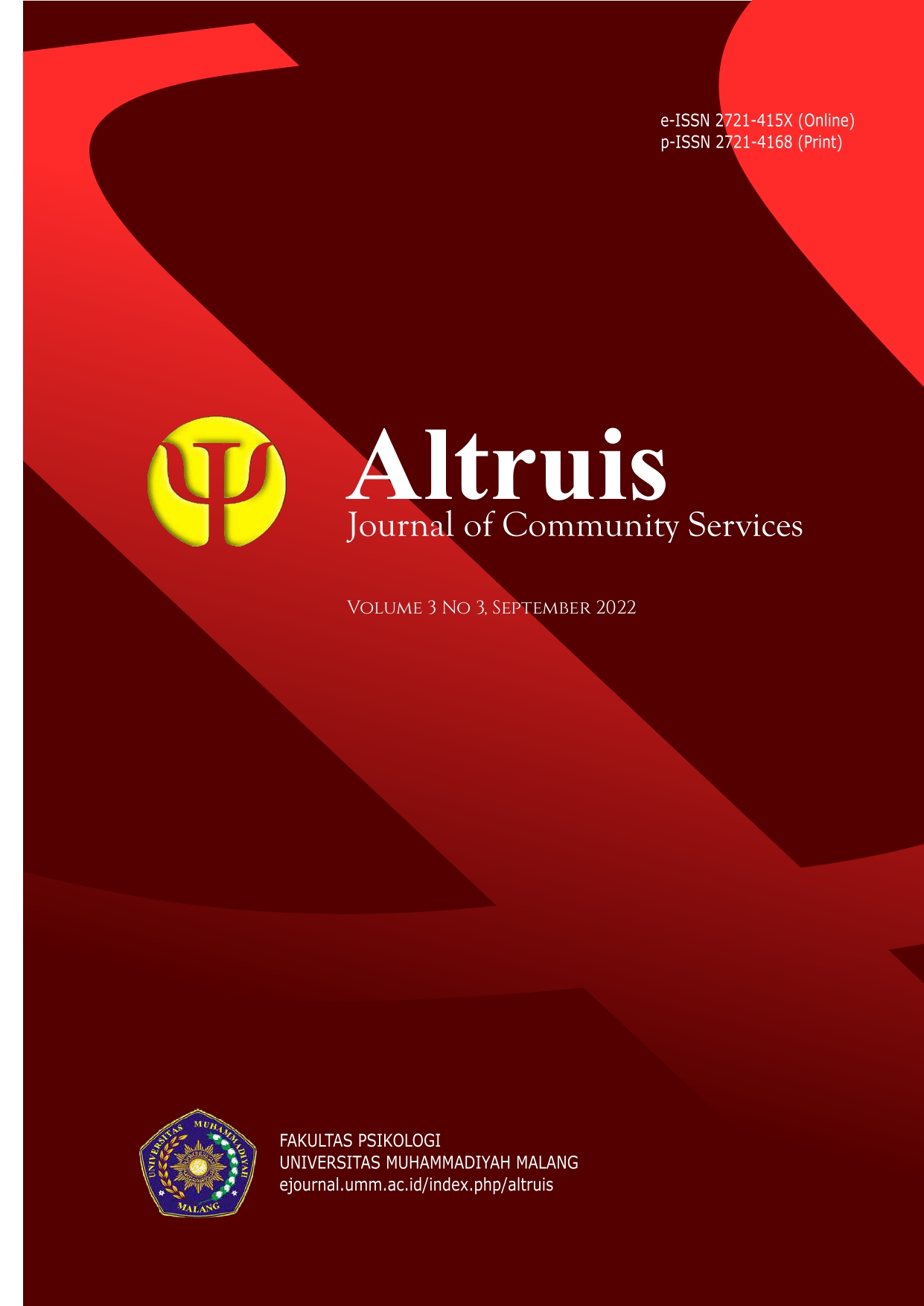Edukasi tentang pernikahan dini dari perspektif psikososial, budaya dan kesehatan reproduksi
DOI:
https://doi.org/10.22219/altruis.v3i3.20988Keywords:
Culture, Early-age marriage, Psychosocial, Reproductive healthAbstract
There has been an increase in cases of early marriage nationwide during the Covid-19 pandemic. Based on data from the Central Java DP3AP2KB, there were 11,301 cases of early childhood marriages for girls and 1,671 for boys. This also happened in Semarang Regency, Central Java, which was caused by the decline in the economic level of the community so that marrying underage children was considered as an alternative problem solving. For this reason, it is necessary to have an early marriage prevention program in the form of changing people's mindsets, especially mothers and children, which also provide solutions to the problems of early marriage. The program that is run as an effort to prevent early marriage is the Early Marriage Community Partnership Program (PKM) from Psychosocial, Cultural and Reproductive Health Perspectives. This is considered important because psychosocial, cultural problems and lack of understanding of reproductive health are the drivers of early marriage. Education for PKK mothers, youth and youth organizations has succeeded in increasing perceptions of the negative impact of early marriage. Education participants also made an agreement to jointly reduce the number of early marriages by involving youth in Karang Taruna activities.
Downloads
References
Ali, Y F., & Rosaline, V F. (2020). Peran sekolah dalam mencegah konten pornografi melalui pendidikan seks. Jurnal Pendidikan Hukum, Politik, dan Kewarganegaraan, 1 (1). 69 – 80.
Angraini, W., et.al. (2019). Faktor yang mempengaruhi terjadinya pernikahan usia dini. Jurnal Biometrika dan Kependudukan. 8(2). 183-191. https://doi.org/10.20473/jbk.v8i2.2019.183-191
Bandura, A. (1999). Social cognitive theory: An agentic perspective. Asian Journal of Social Psychology. 2. 21–41.
BPS Kabupaten Semarang. (2020). Jumlah penduduk kecamatan bergas menurut status perkawinan (jiwa), 2018-2020. https://semarangkab.bps.go.id/indicator/12/300/1/.
Feist, J., & Feist, G. (2010). Teori Kepribadian. Theories of Personality. Salemba Humanika.
Hasan, U., Muskibah., Suhermi., Sasmiar., & Pahlefi. (2021). Penyuluhan hukum tentang peranan orangtua, guru, dan masyarakat dalam mencegah perkawinan dini. Jurnal Karya Abdi. 2 (30). 52-61.
Hasiana, I. (2020). Peran orangtua dalam pendidikan seksual anak usia dini. Wahana 72 (2). 118 – 125. https://doi.org/10.36456/wahana.v72i2.2725
Isnaini, N & Sari, R., (2019). Pengetahuan remaja putri tentang dampak pernikahan dini pada kesehatan reproduksi di sma budaya bandar lampung. Jurnal Kebidanan. 5 (1). 77-80. https://doi.org/10.33024/jkm.v5i1.1338
Mansyur, A. I., Purnamasari, R., & Kusuma, RA. M. (2019). Webinar sebagai media bimbingan klasikal sekolah untuk pendidikan seksual berbasis online (meta analisis pedagogi online). Suloh: Jurnal Bimbingan Konseling Universitas Syiah Kuala. 4 (1). 26 – 30.
Marcoes, L. (2022). Refleksi Kawin Anak. Kompas. Rabu, 5 Januari 2022.
Maudina, LD., (2019). Dampak pernikahan dini bagi perempuan. Jurnal Harkat. 15 (2). 89-95. https://doi.org/10.15408/harkat.v15i2.13465
Nadeak, B., Sormin, E., Naibaho, L., & Deliviana, E. (2020). Sexuality in education begins in the home (pendidikan seksual berawal dalam keluarga). Jurnal Comunita Servizio. 2 (1). 254 – 264. https://doi.org/10.33541/cs.v2i1.1651
Pranita, E. (2021). Pernikahan Dini Meningkat Selama Pandemi, BKKBN Gencarkan Edukasi Reproduksi. Kompas, 1 Oktober 2021. https://www.kompas.com/sains/read/2021/10/01/100000523/pernikahan-dini-meningkat-selama-pandemi-bkkbn-gencarkan-edukasi?page=all
Syalis, E. R. & Nurwati, N. (2020). Analisis dampak pernikahan dini terhadap psikologis remaja. Jurnal Pekerjaan Sosial 3(1). 29-38. https://doi.org/10.24198/focus.v3i1.28192
Tirang, Y & Ladamay, I. (2019). Pernikahan dini akibat pergaulan bebas remaja. Prosiding Seminar Nasional Pendidikan dan Pembelajaran Bagi Guru dan Dosen, 3, 42-49.
Wahyu, A. (2021). Mencegah Dampak Buruk dari Pernikahan Dini di Masa Pandemi. https://retizen.republika.co.id/posts/16182/
Downloads
Published
How to Cite
Issue
Section
License
Copyright (c) 2022 Chr. Argo Widiharto, Farikha Wahyu Lestari, Suhendri

This work is licensed under a Creative Commons Attribution-ShareAlike 4.0 International License.
Authors who publish in Altruis agree to the following terms:
- For all articles published in Altruis, copyright is retained by the authors. Authors give permission to the publisher to announce the work with conditions. When the manuscript is accepted for publication, the authors agree to automatic transfer of the publishing right to the publisher.
- Authors retain copyright and grant the journal right of first publication with the work simultaneously licensed under a Creative Commons Attribution-ShareAlike 4.0 International License that allows others to share the work with an acknowledgment of the work's authorship and initial publication in this journal.
- Authors are able to enter into separate, additional contractual arrangements for the non-exclusive distribution of the journal's published version of the work (e.g., post it to an institutional repository or publish it in a book), with an acknowledgment of its initial publication in this journal.
- Authors are permitted and encouraged to post their work online (e.g., in institutional repositories or on their website) prior to and during the submission process, as it can lead to productive exchanges, as well as earlier and greater citation of published work (See The Effect of Open Access).
This work is licensed under a Creative Commons Attribution-ShareAlike 4.0 International License.


